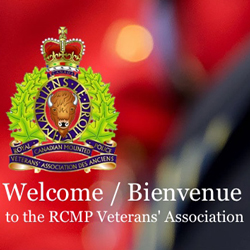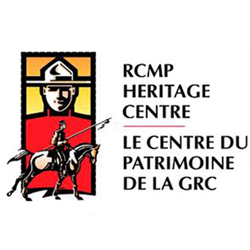Supt. Howard Cronkhite
Howard Cronkhite spent most of career in the Yukon and participated in many long and extreme cold dog sled patrols as did many other members.
Most recently, RCMP Veteran Bob Boyd discovered a report Howard Cronkhite submitted to his Officer Commanding in 1924 outlining the hardships that he and other members experienced while working in the Yukon.
BACKGROUND
Howard Hooper Cronkhite was born on January 21, 1898 at Parry Sound County in Ontario.
With the outbreak of World War I, Howard Cronkhite stepped forward to enlist in the 82nd Battalion (Lethbridge Alberta) on October 1, 1915 and was assigned the CEF No.#160422.
Prior to joining the 82nd Battalion, he was employed as a banker in Lethbridge Alberta and was unusually tall standing 6’0”.
While overseas in Western Europe, he served in France, Belgium and Germany with the First Canadian Machine Gun Corps. On May 9, 1919, he was demobilized. For his service in World War I, he received the 1914-1915 Star, the General Service and Victory Medals.
JOINS THE FORCE
Having enjoyed his time in uniform, Howard decided to join the Royal North-West Mounted Police and was sworn in on February 5, 1920 and was assigned the regiment number of 9024.
On March 1, 1920, he was transferred to Rockcliffe as a component of the 160 members moved to Ottawa when the Force’s headquarters switched from Regina to Ottawa. Howard was a member of the RCMP Musical Ride that rode 78 miles from Ottawa to Precott to put on a display of horsemanship. After the performance, they rode back to Rockcliffe.
With only three months in the Force, Howard Cronkhite was promoted to the rank of Corporal. He remained at Rockcliffe and was transferred back to Regina on July 1, 1922 and on the same day transferred to Dawson City.
On February 5, 1924, Howard was next transferred to Whitehorse where he performed many patrols and duties as directed by the Officer Commanding Whitehorse District.
On February 14, 1925 at Whitehorse, Corporal Howard Cronkhite wrote a report to the Commanding Officer of Whitehorse Yukon. The details of his report are as follows and were discovered by RCMP Veteran Bob Boyd:
SUBJECT: Patrol To Wellesley Lake, White River District
I have the honour to submit the following report in connection with the above mentioned patrol.
Acting under instructions received from the Officer Commanding Whitehorse Sub-District, I left Whitehorse with dog team of five dogs on January 7th, 1925 at 11:30 am, to investigate the smuggling of American Goods into Canadian Territory by the Messers. Green and Lawrence, Traders of Wellesley Lake, and the illicit manufacture of Liquor and sale to Indians by those men, in connection with which I carried written instructions, etc. as to my duties and appointment as Customs Excise enforcement officer.
I arrived at Takhini at 5:30 pm Miles travelled 22. Temp. 20 below zero.
Jan. 8th Left Takhini at 11 am, late in getting started as one of the dogs had frozen his foot during the night, but he was too far gone to do anything with him, had to do away with him and proceeded on to the 31 mile Post where I picked up another dog from Angus McLeod. Arrived at 31 mile Post at 2:30 pm. Miles travel 9. Temp. 32 below.
Jan. 9th Left 31 mile Post at 9 am arrived at Little River 12:45 pm met a musher by name of Bill Forbes from Keno Hill on his way Outside. Trail heavy with fresh snow. Miles travel 10. Temp. 4 below.
Jan. 10th Left Little River 8 am arrived at Nordenskiold at 2:30 pm met Indian by name of George Red on his way to 52 mile Post. Miles travelled 22. Temp. 4 below.
Jan. 11th Left Nordenskiold at 8:30 am arrived Braeburn at 1:30 pm. Miles travelled 22. Temp. 14 below.
Jan. 12th Left Braeburn at 8:45 am arrived at Montague at 2:30 pm. Miles travelled 24. Temp. 40 below.
Jan. 13th Left Montague at 9 am, arrived at Carmacks at 2:30 pm. Miles travelled 22. Temp. 36 below. Wire received from O.C. Whitehorse. “Wait at Carmacks for instructions from Dawson.” Wire received from O.C. Dawson. “Answer not received from Customs department you had better go on if instructions come will wire you at Coffee Creek can only advise that if seizure made and curosity too great to bring out one of you come to Coffee Creek and wire for further instructions.”
Jan. 14th At Carmacks getting read to proceed on patrol to Wellesley Lake in company of Reg. No. 8716 Constable Thorthwaite, A.B. Temp. 10 below.
Jan. 15th Left Carmacks at 10 am with Cst. Thorthwaite and two teams of dogs 5 and 4, trail heavy with fresh snow, going very slow, arrived at Yukon Crossing 5:15 pm. Miles travelled 22 Temp. 4 below.
Jan. 16th Left Yukon Crossing at 9 am had to break trail all the way to Minto, met J. Woods with mail stage on his way to Yukon Crossing. Arrived at Minto 4:45 pm. Miles travelled 25. Temp. 5 below.
Jan 17th Left Minto at 8:45 am, trail had as we had to follow along the Yukon River and ice was very rough where it had jammed up. Sleigh and toboggan tipping over all the time, and we both got into over-flow, arrived at Hell’s Gate 3:45 pm met John F.K. MacMartin mail carrier from Selkirk here on his way to Minto. Miles travelled 15. Temp. 38 below.
Jan. 18th Left Hell’s Gate at 8:45 am, crossed the Yukon River and proceeded to Selkirk along bench on left limit, arrived at Selkirk 12 noon. Miles travelled 10. Temp. 22 below.
Jan. 19th At Selkirk getting provisions and toboggan to proceed on patrol with as sleigh is useless just acts as a snow plough when there is no trail, purchased one for $20.00 from an Indian by name of Robert Joe. Temp. 30 below.
Jan. 20th Left Selkirk at 9:15 am, trail heavy with fresh snow and full of glaciers, both of us went into our waits in water, could not stop to change clothes as we were travelling through green timber, so kept on going till we came to a wood-cutters cabin by name of Harry Davis. Arrived at Davis’s cabin at 5:30 pm. Miles travelled 20. Temp. 25 below.
Jan. 21st Left Davis’s cabin at 9:45 am followed along river and in the back of soughs came to Chas Smith’s cabin, wood-cutter, on an island, getting colder all the time. 58 below at Smith’s so we stopped there. Miles travelled 6. Temp. 54 below.
Jan. 22th Still at Smith’s, too cold to travel. 69 below and never went above 60 during the day.
Jan. 23rd Still at Smith’s Temp 70 below. Kept busy cutting fire wood, running short of dog feed. Purchased 9 lbs. of rice from Smith @ 15 cents per pound.
Jan. 24th Still at Smith’s. Temp. 69 below.
Jan. 25th Still at Smith’s. Temp. 70 below, went up to 65 by noon. Constable Thornthwaite and myself went out hunting Caribou for dog feed, but there was none to be seen.
Jan. 26th Left Smith’s at 6:30 am and proceeded down river, going very slow on account of ice jammed up, rode along in the back sloughs, were careful on account of open waters and overflow. Got out on the main channel of the river, as there were no more sloughs to follow, ice got worse, jammed up in high as nine and ten feet, impossible to get over it, made to two miles from Selwyn but could go no further, go feed, rested the dogs and then returned to Smith’s cabin, arrived there at 4 pm, miles travelled 9. Temp 64 below.
Jan. 27th Left Smith’s cabin at 12 noon, arrived at Davis’ cabin 1 pm, proceeded onto W.J. Marschall’s, wood contractor, cabin, two miles further on as Davis’s cabin was too filthy to stay in, arrived at Marshall’s at 3:30 pm. Travelled 8. Temp. 64 below. Sent the following wires to the O.C. Dawson per phone from here to telegraph station at Selkirk: – “Patrol returning to Selkirk unable to proceed on account of ice jam in river were within 2 miles of Selwyn. Patrol could proceed via Scroggie and Kirkman Creeks, Patrol is at Marschall’s cabin 19 miles below Selkirk, will leave for Selkirk in morning.”
“Harry Davis and wife and two children destitute 20 miles below Selkirk no food in cabin no credit allowed at store two children sick for want of proper food. Wire instructions for patrol and Davis.”
Received the following reply from O.C. Dawson re Davis: – “Arrange credit at Selkirk twenty dollars food supplies Davis. You can go via Scroggie when weather moderates.”
Jan. 28th Left Marshall’s cabin at 8:0 am arrived at Selkirk 1:20 pm. Miles travelled 20. Temp. 74 below.
Jan. 29th At Selkirk. Received the following telegraph from O.C. Dawson. “You will have to return to Carmacks when weather moderates. Can you get sufficient dog feed at Carmacks for trip via Scroggie.” In answer to the telegram of same date which read as follows: – “Out of dog feed local supply exhausted unable to proceed.” Temp. 70 below.
Jan. 30th At Selkirk. Temp. 68 below.
Jan. 31st At Selkirk. Temp 68 below.
Feb. 1st At Selkirk. Temp. 60 below.
Feb. 2nd At Selkirk. Temp 45 below.
Feb. 3rd Left Selkirk at 8:30 am, broke nose of toboggan coming down a hill onto the River where it hit a tree, but managed to proceed with it to Minto, where we arrived at 2:30 pm. Miles travelled 26. Temp. 45 below.
Feb. 4th Patched toboggan up with tin and left Minto at 8 am. Arrived at Yukon Crossing at 2:30 pm, trail bad with drifted snow. Miles travelled 24. Temp. 34 below.
Feb. 5th Left Yukon Crossing at 8:10 am arrived at Carmacks at 1:30 pm. Miles travelled 20. Temp. 38 below.
Feb. 6th At Carmacs awaiting instructions from the Officer Commanding at Dawson regarding the patrol and repairing dog harness. Received the following wire from the O.C. Dawson. “Patrol cancelled for present return to Whitehorse.”
Feb. 7th At Carmacks and left for Montaque.
Febr 8th Arrived at Monaque 9 am. Miles travelled 23. Temp. 24 below.
Feb. 9th Left Montaque at 8:30 am arrived at Braeburn at 2 pm. Miles travelled 24. Temp. 2 below.
Feb. 10th Left Baeburn at 8:15 am arrived at Nordenskiold at 12:45 pm. Miles travelled 22. Templ. 26 below.
Feb. 11th Left Nordenskiold 9 am arrived at Little River at 1:30 pm. Miles travelled 22. Temp 2 below.
Feb. 12th Left River 8:30 am arrived at Whitehorse at 5:30 pm. Miles travelled 40. Temp. 2 below.
DESTITUTES: Referred to under date of Jan. 27th, One Harry Davis, age 47, place of birth Peterborough, Ontario next of kin, wife, name Bella Grace Davis, wife’s name before marriage Bella Grace Woods (Indian) of Moosehide, Dawson Y.T. Number of children two, ages respectively 21 years (boy) and (girl) 8 months. Military service 4 years and 3 months with 22nd Battalion C.E.F. has shrapnel wounds and has been gassed. Debts. W.J. Marshall, Wood Contractor – $250.00
Taylor & Drury Ltd. Selkirk – $120.00
Schofield & Zimmerless. Selkirk – $350.00
This man is included to be lazy, he has had a good showing to make money this Fall by cutting wood for W.J. Marshall. He stated that his house work at home kept him pretty busy with washing and cooking and looking after the children while his wife does nothing but sit around the cabin. He was advanced so much money from W.J. Marshall to buy supplies with this Fall, but buys his wife high heeled shoes and bought nothing but canned goods, though I believe h has now been taught his lesson for his two children were sick in bed from want of proper food, all they had in the cabin was a quarter of caribou. When he was in Selkirk he sold his three dogs harness and sleigh for fifty dollars and with the twenty dollars that he was advanced from the Territorial Government, he took out in food such as flour, rice, bacon. In fact a good stock of groceries without buying anything foolish.
INDIANS: The Indians through this district with the exception of Indians at Selkirk are catching a lot of fur but the wolves and coyotes bother them quite a bit, they tear the skins to pieces and leave the animals in the traps. The Indians at Selkirk do nothing but lay around their cabins until they run short of meat then go out and shoot a caribou, hearly visit their trap lines at all and during the cold weather they did not have enough fire wood to see them through, they received permission to use the logs out of some old buildings that Mr. Scolfield owns. Their dogs are nothing else but walking skeltons, they hardly feed them at all and each Indian has about eight dogs.
From Yukon Crossing to Little River the Indians had traps some in the trail and some not three feet off the trail, I had to turn one dog loose and let him run on ahead of the team to locate the traps, which I picked up and brought to Whitehorse, as no one seemed to know who the traps belonged nor has anyone claimed them. I also picked up a red fox caught in a trap out of season between Yukon Crossing and Carmacks which I left with Angus McLeod at 31 mile post on Dawson trail to skin and stretch and who will send it into Whitehorse as soon as it is ready. This fox was caught about Feb. 5th 1925.
GAME: The following game is plentiful, Caribou, fox, lynx, wolves, coyotes, wolverines and mink, but moose appear to be very scarce.
COMPLAINTS: I received no complaints from either white men or Indians.
TRAILS: The Dawson trail from Whitehorse to Minto is in good shape, but at times was badly drifted. After leaving the trail at Minto we had to follow along the River which was bad on account of the ice but when they had chopped it out to carry the mail from Selkirk to Minto it was fairly good, at this point you go along for about three miles on the river and then out in on the main land again then out on sloughs until you get to Hell’s Gate when you cross the river and go along a hog’s back into Selkirk, which is a well beaten dog trail. From Selkirk you go on what they call the main land cut off. There has not been much traffic on this trail and it was hard to follow as it has practically not been cut out, you just go through the bush for about twenty miles and then come out on the river at W.J. Marshall’s, from there on you follow the river on all the back sloughs as much as possible, as the river ice is very rough, after about 15 miles the ice is piled up so high you cannot get over it. From Selwyn to Coffee Creek is the worst part on the river, four different people have tried to make it through with dogs, but all had to turn back. Some of these people were coming from Coffee Creek and some going from Selkirk. The old timers in the country say that they have never seen the river freeze so rough for years.
GENERAL REMARKS: While at Selkirk Mr. Scofieldof Scofield & Zimmerlee, told me that Jack Lawrence of Wellesley Lake had been into Coffee Creek and had phoned him about getting supplies for Wellesley Lake as they were completely sold out. Scofield told him that he could supply him alright so Lawrence was going to come on to Selkirk with a team of horses but had to turn back on account of ice. I was speaking to Scofield regarding trails when he told me this.
The following is pair of gauntlet-style mitts covered on the exterior with otter fur. The palm of the mitts is lined with buckskin. The interior of the glove is lined with khaki green felt. Written on the interior of both mitts is the following “H.H.C. RCMP” – referring to the owner Howard H. Cronkhite. This was for winter kit, and was established for use in 1920, to be worn with an otter fur Klondike Cap. This gauntlet-style winter glove was abolished by the Force in 1933.
Howard Cronkhite remained in the North for the next twelve years. While stationed there, he was promoted to Sergeant on April 1, 1928 and on September 1, 1928 was married Katherine Veronica Barton who was a Victoria nurse working at the Dawson General Hospital.
On July 7, 1935, he was transferred to “E” Division (Vancouver). During 1935, he was one of the background riders in the Metro-Goldwyn-Mayer movie “Rose Marie” which was partially filmed in the Lynn Canyon area of North Vancouver, B.C. For the film, Howard Cronkhite acted as the “double” for the star – Nelson Eddie.
On November 1, 1940, he was promoted to sub-inspector and two years later to inspector. Then on July 1, 1942, he was transferred back north where he remained for only one year with a short transfer down to the position of Officer Commanding Swift Current Sub-division for one year. After this term, he was transferred back to “G” Division and promoted to the rank of Superintendent on May 1, 1949.
PASSES AWAY SUDDENLY
While in Ottawa, he suddenly passed away on December 28, 1949 and was buried in Ottawa.
It was said of Howard – “during his long service, Superintendent Cronkhite’s experience embraced every phase of RCMP life, from troop leader on a Mounted Section to his last position in charge of the policing of all Canada’s vast northland. And it was shortly after returning from an inspection tour of the northern division that he became ill.”[1]
An extract from the Ottawa Journal paid tribute to the late Superintendent Cronkhite by stating “The men from “G” Division patrol the vast areas of the North West Territories and Yukon, dealing very often with Indians, and Eskimos whose knowledge of the white man’s law is rudimentary and who see in a Mounted Policeman the very agent of the King himself, an infallible upholder of justice. Here is no haven for the policeman of the strong arm, the bullying voice, the aggressive countenance. Here is the opportunity for diplomacy, wisdom, and the patient capacity of the teacher… Here is the demand for courage in facing loneliness, in travelling the far snow-swept trails, in making plain and enforcing the law with unbending determination.
“The command of men who seek such duty cheerfully is a privilege the Police grant only to those long tested in the service, officers who have shown humanity as well as skill, patience as well as courage. And that is the measure of the loss we mourn today.”[2]
TRIBUTE TO HOWARD CRONKHITE
In 1973, a mountain top was named in honour of the contributions made by Superintendent Howard Cronkhite – Mount Cronkhite, Yukon – west of the Blackstone River (Lat: 65·31·00N Long: 137·08·00W).
[1] Obituary article of Supt. H.H. Cronkhite published in the April 1950 Quarterly magazine.
[2] Obituary article of Supt. H.H. Cronkhite published in the April 1950 Quarterly magazine.


 January 8, 2013
January 8, 2013 














